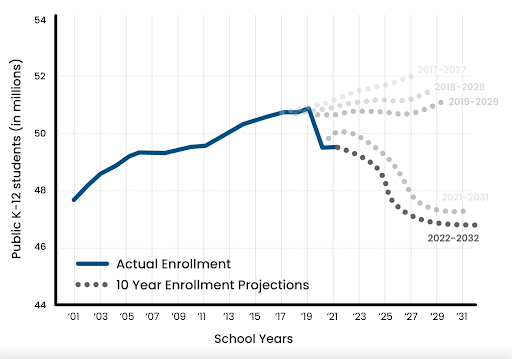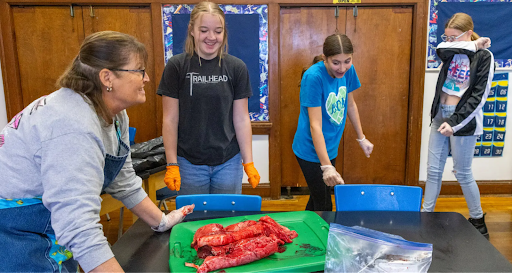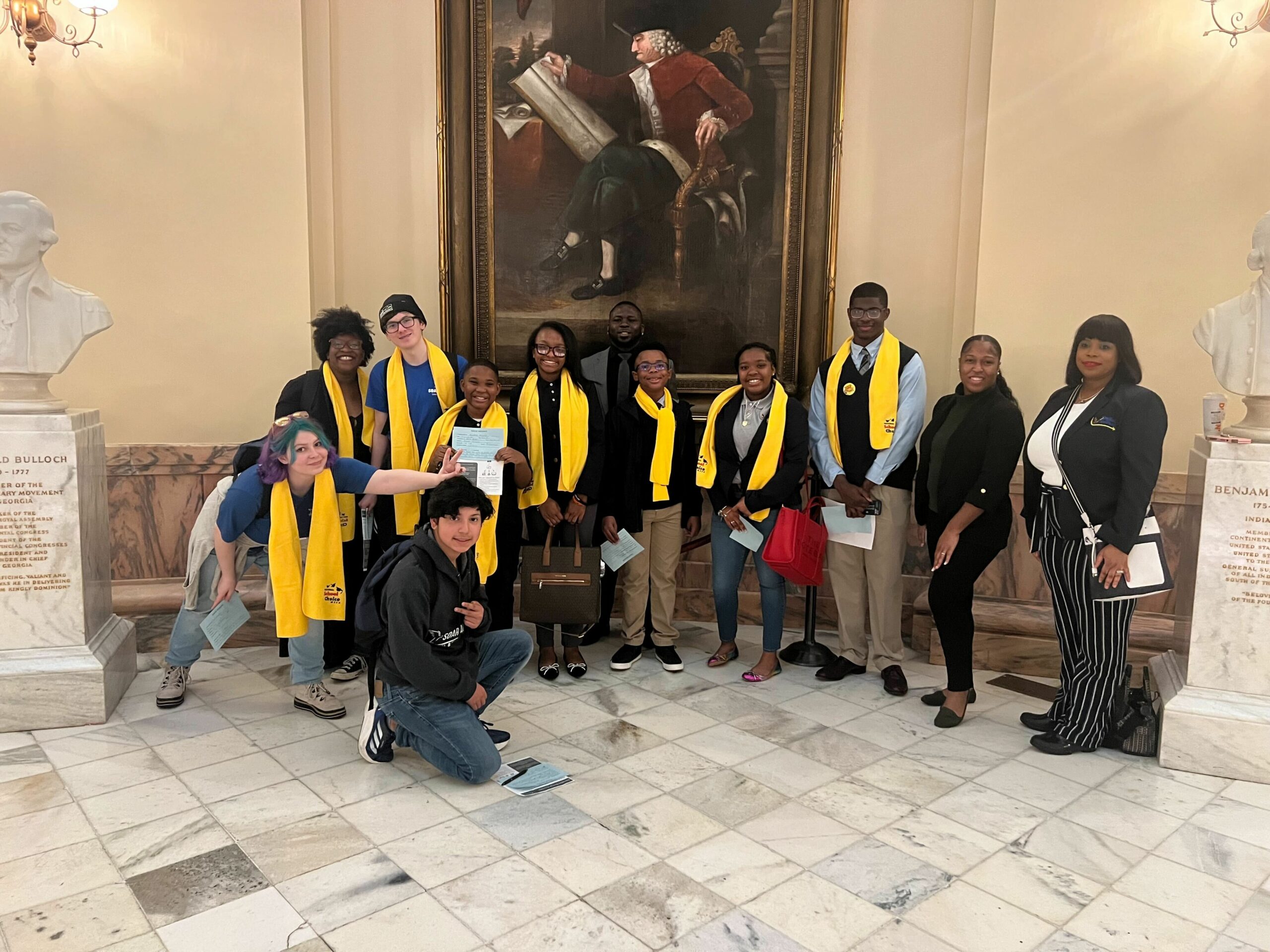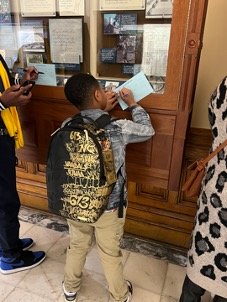Jump to: Top Tasks | From the Field | Key Resources | Moments of Resilience
It’s week 214 of our new reality and we are thinking about what enrollment declines mean for the future of public education.
“According to the center’s most recent data, public schools served 1.2 million fewer students in 2022-23 than they did in the last year before the COVID-19 pandemic,” writes Chad Aldeman in The 74. “The COVID-era enrollment declines were due to a combination of factors — a rise in homeschooling, a shift to private schools, fewer school-age children and some students who simply went missing from the data.”
But that is nothing compared to what is to come.
In a striking chart, Aldeman shows how projections for student enrollment have shifted dramatically over the past several years. As recently as 2018, the National Center for Education Statistics (NCES) was projecting that student enrollment would grow steadily over the course of the decade. That projection has been revised downward every year since. It now “projects that public schools, including public charter schools, will lose an additional 2.4 million students (4.9%) by 2031.”
SUBSCRIBE

Where does this shifting reality fit in a vision for a better system of education for all?
There is a danger that a system in decline could hunker down and turn inward to protect what already exists. If we choose that path, we will likely see increasing calls for bailout-style bills that focus on preserving half-empty infrastructure rather than expanding opportunities for students.
We hope instead that communities embrace the necessary opportunity to make sure this money makes its way to families and students rather than staving off cuts to an already bloated bureaucracy. That in turn could open up the opportunity for expanding the promises we make to families, including free tutoring, free summer camp, new career paths and more. And that starts with believing in better.
TOP TASKS
Rethink recruitment to power the future of education
We connected last week with Teach For America CEO Elisa Villanueva Beard for a candid and far-ranging conversation about TFA’s past, present and future. In the discussion, Elisa reflects on her more than 25 years at the organization, from her time teaching in Texas’ Rio Grande Valley to confronting the challenges of the Covid-19 pandemic.
In the early days of the pandemic, the organization faced two crises at once: how to help meet the immediate needs of students and how to train an entire incoming class of corps members with schools going virtual.
“The first thing we did is we went out to test with principals and superintendents: Will you hire our teachers if they have never practiced teaching in their life and they mostly don’t have an education background? We’ll still figure out how to prepare them the best we can virtually which we don’t have a curriculum for. But do you want them? We just need to know. Is the demand going to be there?” Elisa shared. “And they all said yes … So we went virtual. And we created a new curriculum within 10 weeks to then execute on how to train our teachers virtually on what they need to know on the basics of teaching.”
At the same time that they were adapting to the challenges of the pandemic, Elisa led TFA to rethink what the organization can do to match its unique assets with what kids need in this new era. She concluded that one big opportunity to make a difference is leveraging its recruiting strength to build a tutoring fellowship.
“We have a reinvention lab that helped create the prototype and the pilot. And in that first year, she had just over 100 tutors,” Elisa shared. “Today, we have 2,300. And the evidence is incredible on what they’re able to accomplish. 93% of our principals say that our corps members are having an effective impact on student achievement … And so we have a big goal of getting to 10,000 tutors by 2030.”
THE TASK OF THE WEEK IS
AdvocacyLabs
By popular request, Derrell is back with another AdvocacyLabs video and this time, he’s diving into politics. In the episode, Derrell asks a big question–“Do campaigns really matter?”–and the answer is going to surprise you.
THE TASK OF THE WEEK IS
FROM THE FIELD
The team at Transform Education Now is working hard on behalf of HB24-1448, the Colorado education funding reform bill that, if passed, will establish new weights to provide extra resources to low-income, special education and multilingual students. A House floor vote last week saw the bill pass 54-10 and a Senate vote is expected in the days to come. We’ll keep you posted.
Meanwhile in North Carolina, CarolinaCAN is hard at work encouraging the Senate Appropriations Committee to pass a big financial boost for the state’s new ESA. With a waiting list of over 70,000 students in just the first year of the program’s existence, significantly more funding is needed to meet the needs of families.
Key Resources
“The Broken Promise of Brown vs. Board of Education,” a report released by Available to All, asks and answers the question of what we can do to guarantee equal access to public schools.
Education Next has the latest research on Teach For America, discovering that TFA corps members who stay in the classroom more than five years improve at double the rate of traditionally certified teachers.
New research from Georgetown University suggests that while selective colleges did diversify their student populations over the past decade, there are major gaps across both race and family income when compared to the make-up of graduating high school classes and non-selective colleges.
Research published in Brown University’s EdWorkingPaper series finds large differences in letter of recommendation length and quality between public and private high schools.
Brookings Institution reports on new research showing that exposure to computer science coursework in high school makes it more likely students will earn a computer science degree in college and improves their early-career prospects after college.
Moment of Resilience

Students from the Ladies of Favor Dream Academy show off the signing pens they received from Governor Brian Kemp after he signed SB233, the Georgia Promises Scholarship Act, into law. The students were joined by hundreds of people who came to the Capitol in collaboration with GeorgiaCAN to advocate in support of the bill. The new law will dramatically expand opportunities for families to find the educational environment that best fits the needs of their children.






